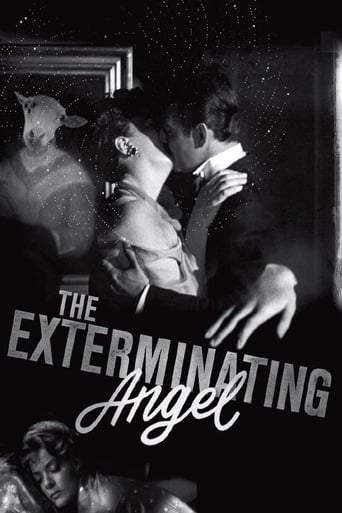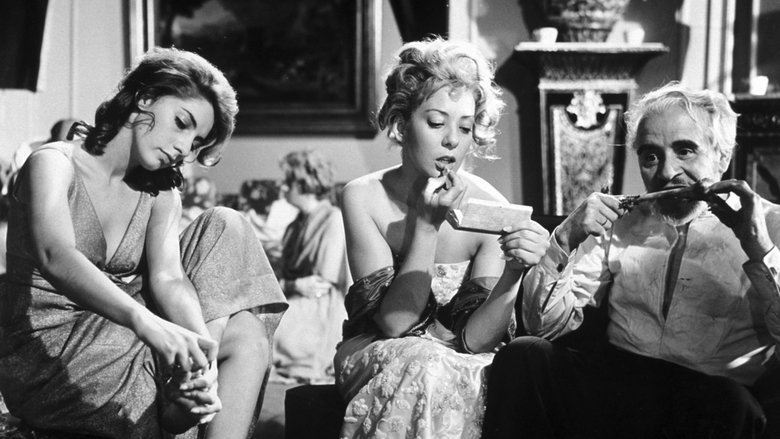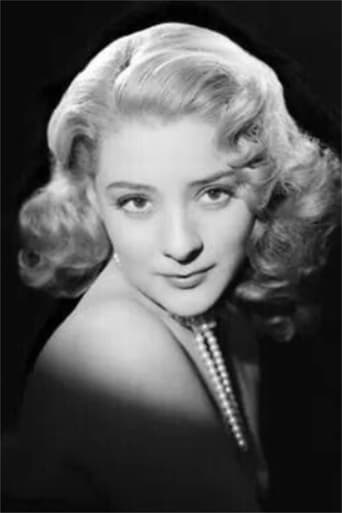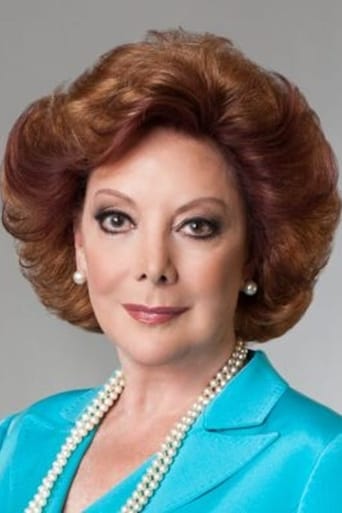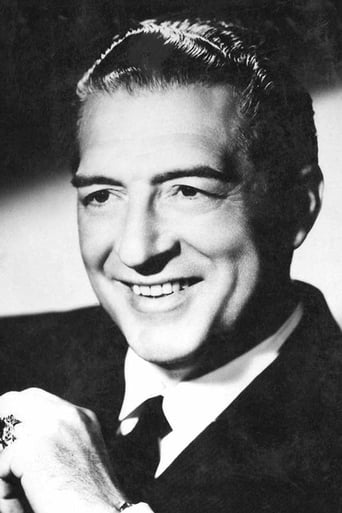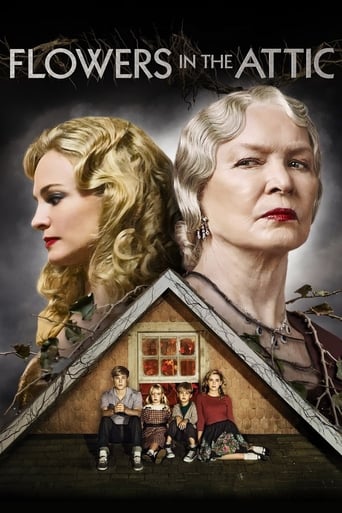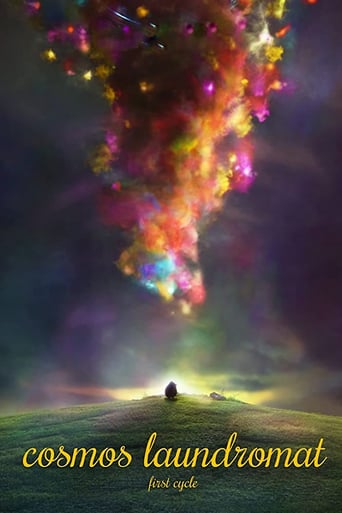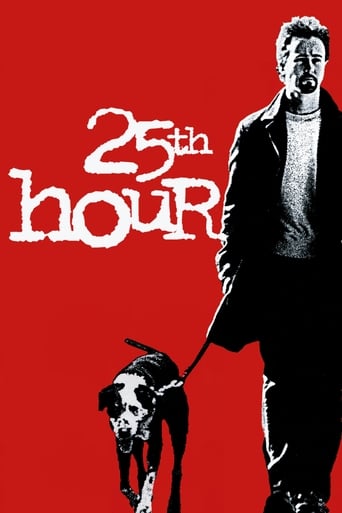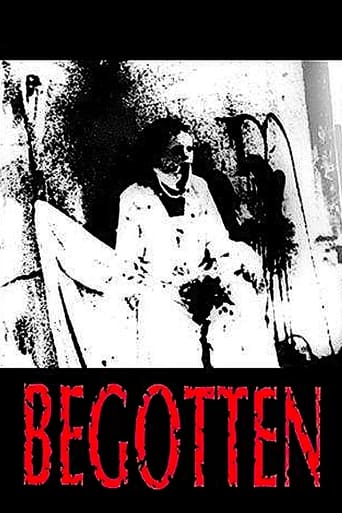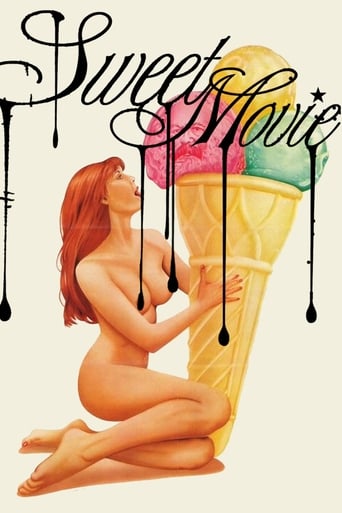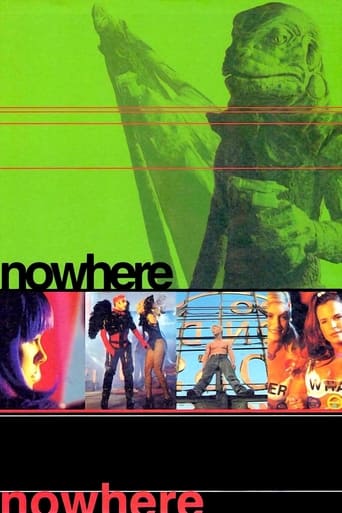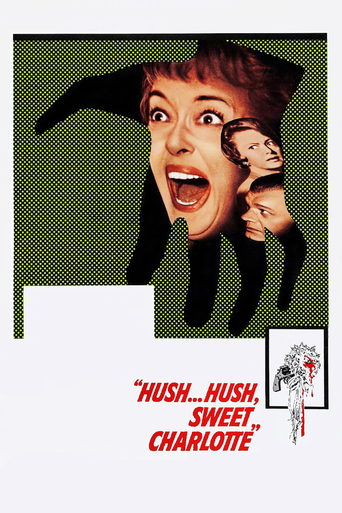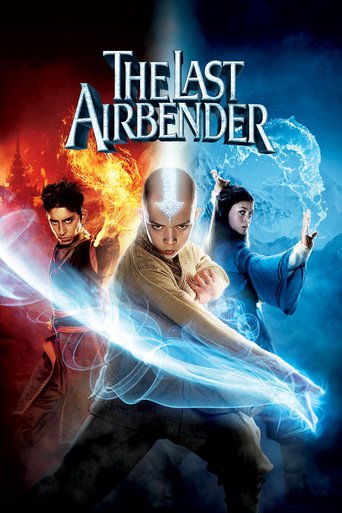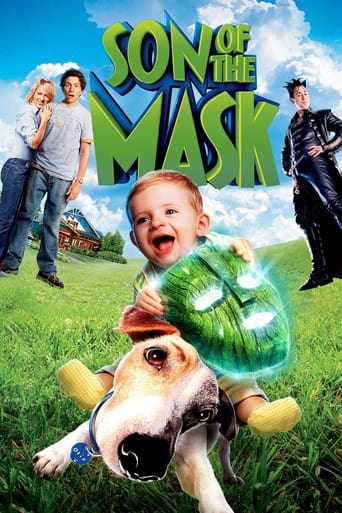The Exterminating Angel (1962)
After a lavish dinner party, the guests find themselves mysteriously unable to leave the room.
Watch Trailer
Cast


Similar titles
Reviews
So much average
Save your money for something good and enjoyable
If you don't like this, we can't be friends.
True to its essence, the characters remain on the same line and manage to entertain the viewer, each highlighting their own distinctive qualities or touches.
THE EXTERMINATING ANGEL is a surrealist drama about a high class as social parasites, which are gathered in one place.After a visit to an opera, a group of fashionable people from high society has gathered at a party in a villa of a respected gentleman and his wife. However, their servants unaccountably leave their posts. The guests enjoy a luxurious and somewhat strange party. They notice, after dinner, that's all the servants gone, and that they can not get out of a music salon, even though all the doors and windows are open. The guests consume what little drinks and food are left from the previous night's party. Days pass, and their situation is complicated. They become hungry, thirsty, sick and hysterical...Mr. Buñuel has offered a strange display of human degradation, which has brought depression and hostility in a civil conflict. He has, through a surreal approach, manipulated with the characters, pulling out all the best and worst characteristics from them. An isolation is a mystery in this film. However, an isolation is a form of decision in the real world.Mr. Buñuel has showed us one of the characters of a privileged society, which is symbolically lost in its sole discretion. The story is a quite nervous and depressed, the pace is engrossing and transitions are explosive.Director's focus is on his people and situations in the society to which he belongs. This exceeds a surreal character and satire in this film.The acting is very good. I would mention Silvia Pinal (Leticia), as the voice of reason and realization.This is an unusual and frustrating game, which examines the patient with the audience.
One of Bunuel's most rare and amazing , ¨The Exterminating Angel¨ is packed with surreal moments , criticism , absurd situations and astonishing nightmares . This is one Buñuel's best , including characteristically scatological satire , fierce as well as surreal nightmares and surprising events . Dramatic film about strange relationships among various members of higher class when they remain locked into a mansion . As a luxurious mansion is the place wherein some dinner guests find they cannot for any definable reason leave the dining room . This is weird story about a group of higher class , a drama with surrealism and sour portrait upon social stratum , catholicism , with plenty of dream imaginary and many other things , being stunningly realized by the Spanish maestro of surrealism , the great Luis Buñuel . This is a typical Buñuel film , as there are a lot of symbolism , social critique , including mockery or wholesale review upon religion , especially Catholicism . Luis Buñuel was given a strict Jesuit education which sowed the seeds of his obsession with both subversive behavior and religion , issues well shown in a lot of films and that would preoccupy Buñuel for the rest of his career . Here Bunuel gives a perverse studio about wealthy people , desire and tension when a misfit bunch is closed for any inexplicable reason ; and even being strongly cut and banned by Russian censorship because the idea of people not being allowed to "leave a party" was considered offensive and anti-government . The scene where a bear and two sheep appear during the dinner party was based on a real incident at a dinner party that Buñuel once attended in New York . In his autobiography Luis Buñuel claims he was asked by Warner Brothers to work on a story that eventually was filmed as The beast with five fingers (1946) , it contains many of the elements of the earlier film including the large mansion, piano recital, and stabbing of a disembodied hand . Interesting and thought-provoking screenplay from the same Luis Buñuel and Luis Alcoriza, Buñuel's usual screenwriter ; they pull off a straight-faced treatment of shocking subject matter .The movie script was original and early working title "The Castaways of Providence Street" , then Luis Buñuel took the title The Exterminating Angel from his friend José Bergamin, the Spanish poet, who had mentioned it the year before for a play he wanted to write . Out of all the films in Luis Buñuel's Mexican/Spanish film period, this is the only film he had complete creative control over . Nice acting by all-Mexican-star cast such as Claudio Brook , Jacqueline Andere , Enrique Rambal and Silvia Pinal of Viridiana , among others . The film relies heavily on the relationship between them , as are developed love-hatred conflicts . Furthermore , Buñuel satirizes and he carries out outright critical to aristocracy , bourgeoisie and attack upon religion . Atmospheric as well as evocative cinematography by Gabriel Figueroa , Buñuel's ordinary . This thoughtful and dramatic motion picture was well produced by Gustavo Alatriste and compellingly directed by Luis Buñuel who was voted the 14th Greatest Director of all time . This Buñuel's strange film belongs to his Mexican period ; in fact , it's plenty of known Mexican actors . Born in Calanda , Aragon (1900) , Buñuel subsequently moved to Madrid to study at the university there, where his close friends included Salvador Dalí and Federico García Lorca. After moving to Paris , at the beginning Buñuel did a variety of film-related odd jobs , including working as an assistant to director Jean Epstein . With financial help from his mother and creative assistance from Dalí, he made his first film , this 17-minute "Un Chien Andalou" (1929), and immediately catapulted himself into film history thanks to its disturbing images and surrealist plot . The following year , sponsored by wealthy art patrons, he made his first picture , the scabrous witty and violent "Age of Gold" (1930), which mercilessly attacked the church and the middle classes, themes that would preoccupy Buñuel for the rest of his career . That career, though, seemed almost over by the mid-1930s, as he found work increasingly hard to come by and after the Spanish Civil War , where he made ¨Las Hurdes¨ , as Luis emigrated to the US where he worked for the Museum of Modern Art and as a film dubber for Warner Bros . He subsequently went on his Mexican period he teamed up with producer Óscar Dancigers and after a couple of unmemorable efforts shot back to international attention with the lacerating study of Mexican street urchins in ¨Los Olvidados¨ (1950), winning him the Best Director award at the Cannes Film Festival. But despite this new-found acclaim, Buñuel spent much of the next decade working on a variety of ultra-low-budget films, few of which made much impact outside Spanish-speaking countries , though many of them are well worth seeking out . As he went on filming "The Great Madcap" , ¨The brute¨, "Wuthering Heights", ¨El¨ , "The Criminal Life of Archibaldo De la Cruz" , ¨Robinson Crusoe¨ , ¨Death in the garden¨ and many others . After returning his native country, Spain, by making ¨Viridiana¨ this film was prohibited on the grounds of blasphemy as well as ¨The milky way¨ or Via Lactea , both of them were strongly prohibited by Spanish censorship . Most Buñuel's films were surreal black comedies , parables that satirized moral hypocrisy , social moral , artistic pretension, and , of course , the Catholic Church . In French-Spanish final period the collaboration with producer Serge Silberman and writer Jean-Claude Carrière gave notorious as well as polemic films such as ¨Viridiana¨ , ¨The Discreet Charm of the Bourgeoisie" and ¨Belle De Jour¨. His last one was the notorious ¨That obscure object of desire¨ (1977
This is probably my favorite Bunuel feature. It combines the surrealist potential of his more abstract works, such as Un chien Andalou, with a solid, if absurd, plot. In this case, a group of bourgeois party goers find themselves unable to leave a room. It gets pretty absurd as they have to bust a pipe in the wall for water and slaughter a lamb for food.Meanwhile outside, no one is able to penetrate the building to save them. It's all pretty absurd and the results are hilarious. It's a premise that would make a great Monty Python skit and somehow makes for a great feature length film, too!
So I've entered into an agreement with my friend Jose who is originally from Spain and now lives in Paris. We're going to pick movies for each other to watch and review. The idea is to get us both out of our normal viewing routines and expose us to something different. The Exterminating Angel was Jose's first pick for me.I'll start off by saying most of Jose's choices in movies are a darker than mine. Jose said that Luis Bunuel is one of his favorite directors and that this was one of his more accessible films. I purposely did not read any reviews of the movie before watching it so that I could develop my own opinions. I read some other reviews afterward to see what other viewers thought.Overall, the movie felt like a combination of a long Twilight Zone episode combined with a surrealistic art house film. The director was clearly making a commentary on the upper class of Mexico at the time the movie was made, including much of the inane interaction that typically happens at social events. The repetitive dialog in some of the scenes showed a lack of interest by some of the characters in each other.Despite being part of the elite of Mexico's society, the group of antagonists was clearly dependent upon their servants. Once the servants disappeared, the veneer of civility began to quickly fade. Bunuel did have a couple of instances where a scene repeated itself, but I frankly did not understand why.The device of having the party guests trapped in the room was never explained, and I think I preferred it that way. As the days began to pass, the feeling of hopelessness became palpable. It was also interesting that those outside of the house were not able to get in as well. One possible interpretation is that they became trapped by their own social conformity. More than a few characters commented on why the others had not left the party, yet none of them attempted to do so. Bunuel may have been saying that this type of social conformity will eventually lead to a societal breakdown. Or perhaps he was saying something different. I don't know for sure.I was a bit surprised that the guests eventually did get out of the room and the house, albeit with some casualties. However, the last scene in the Church with which Bunuel concluded the film was clearly a jab at the Catholic Church. The scene of the goats running into the Church was a bit humorous.Overall, the movie was interesting but it did seem a bit dated to me. However, since I know very little about Spanish or Mexican cinema of the early 60's, I wouldn't be surprised if this was considered avant-garde at the time it was released.

